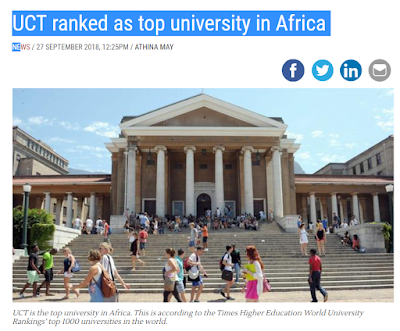It happens occasionally, a few times a year, that I am being asked to be an 'expert commentator' for some newspaper article. Usually it is about higher education, typically about student politics, and I quite enjoy the flattery involved in providing 'expert commentary'. By now I should have learnt that whenever there is something that I do NOT want them to print, I must NOT say it, because it will be exactly that, which they will print. That's Murphy's Law of expert commentary. In the article below, published on 27 September 2018 in one of the three main Cape Town daily newspapers - the Cape Argus - I was asked my opinion about the latest THES university rankings. And guess what - they would of course use my 'scare word' consumer choice 😱 as the preferred keyword in the two printed sentences that came from a good 10 minute talk with Athina May, the very friendly and capable journalist who wrote the story.
The article is copied in full below:
Cape Town - UCT is the top university in Africa.
This is according to the Times Higher Education World University Rankings’ top 1000 universities in the world. It features nine of South Africa’s institutions.
Stellenbosch and Witwatersrand (Wits) universities moved up the ladder from last year’s grading.
However, education specialists argue that the rankings don’t accurately measure a university’s strength in Africa because they don’t take account of socio-economic factors affecting institutions.
More than 1250 higher education institutions across 86 countries were ranked against each other. UCT climbed 15 positions to 156, while Wits landed in the top 250 and Stellenbosch climbed to the top 350.
UCT executive communications director Gerda Kruger said the university was proud of their accomplishment and notable improved score in the research area, which they said confirms their position as a research-intensive institution that makes a contribution to the local and global knowledge pools.
The vice-chancellor and rector of UWC, Professor Tyrone Pretorius, said to date few African universities have featured on global rankings because of their diverse priorities when compared with global elite research universities.
“African universities are operating in developing economies. Research shows that higher education can contribute strongly to economic growth.
“More universities on the continent are realising they must produce graduates who can get to work in their own countries and tackle issues like poverty and inequality.”
Pretorius said universities aimed to meet national goals, and the continent’s needs should be taken into account.
University of the Free State rector and vice-chancellor Francis Petersen agreed. He said the rankings were largely driven by the effect of research generated by universities and where it played a role in the global arena, so universities that weren’t research- intensive were not likely to receive high rankings.
The research director for Higher Education and Development in Africa, Professor Thierry Luescher, said the rankings may not be measuring what we’d like them to, but they played an important role in the public’s perception of higher education institutes.
He said consumer choice was influenced by rankings and high rankings could secure more involvement of businesses in higher education with respect to funding.
Stellenbosch University deputy vice-chancellor of strategy and internationalisation Professor Hester Klopper agreed and said rankings played a role in attracting students and academics from across the world, helping build effective collaborations with other universities, institutions and organisations.
@IAmAthinaMay athina.may@inl.co.za
Cape Argus

